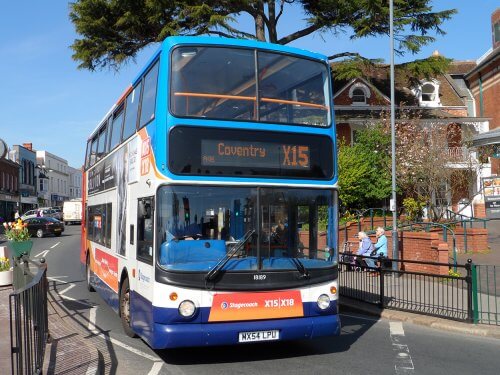In a written decision Midland Red has had the maximum number of vehicles it can operate reduced
Midland Red can now only operate 200 vehicles, down from 261 for the period of 28 days, with effect from 0001hrs on 1 April until 0001hrs on 29 April 2019.
This decision comes after a Public Inquiry held on 30 January at the Traffic Commissioner’s (TC) office, Birmingham, after a bus crash that killed two people (covered in CBW1379).
The repute of the company and of its transport managers however, is retained.
TC Nick Denton noted that Midland Red (South) Ltd failed to ensure that Mr Chander was capable of driving its buses in a safe manner, and that he possessed the appropriate levels of skill and health to do so.
The TC went on to explain that although Mr Chander’s complaint rate over the period of 2012-2015 did not put him amongst the worst of drivers, within this time he should have been referred twice for driver assessment.
In addition to its inability to enforce referrals, the ecodriver champion wanted to see Mr Chander in the summer of 2015, however he was not given sufficient time off from his normal duties.
It was added that the instructions given by the deputy manager at Leamington in April 2015 were also not followed or monitored.

The TC outlined that Mr Chander was then seconded to the Rugby depot without the depot being notified of these instructions. After the loan had ended, the Rugby depot recommended that he be used less or not at all.
This recommendation was also not read by its addressees.
The TC went on to state it was clear from the evidence that the incident on 3 October 2015 was not the result of a one-off error by one person within the company, but instead a series of errors made over time by several people at various levels within the company and of a system which was not adequate to identify and address those errors before they had tragic consequences.
The TC agreed with the judge who tried the case that the culpability of the company was very high.
The TC said that the company has been convicted of offences against the Health and Safety at Work Act 1974 and that it had therefore clearly failed to fulfil its undertaking to ensure that the laws on the driving and operation of vehicles are observed (Section 17(3)(aa) of the 1981 Act refers).
When considering regulatory action, the TC noted that the company’s compliance record was not generally poor, and after having heard of the company’s new procedures, concluded that he was confident that there would not be repetition, and so revoking the operator’s licence would be disproportionate.
The TC also took into consideration the perverse result in revoking the company’s licence or imposing a substantial period of suspension.
The TC said that if such a failure is ever repeated then the complete loss of its right to operate would be the likely consequence.
In relation to the transport managers, the TC noted that he did not see any evidence to suggest that the failures of any individual transport manager were any more serious than those of the company as a whole.
He added that the transport managers named on the license (Messrs Burd, Mortimore, Medlicott and Morgan) were not personally involved in any of the poor decision-making recounted above, although they bear some collective responsibility for the lack of robustness in the company’s procedures and for its failure to ensure the procedures were properly applied.
Equally however, the TC noted that they deserve credit for the company’s improved procedures and for its serious response to the incident and determination to learn lessons.

